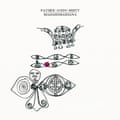Nine years after his breakthrough album I Love You, Honeybear turned Josh Tillman from a minor indie singer-songwriter (and the former drummer of Fleet Foxes) into a critical cause célèbre, most people with any interest know broadly what to expect from a new release under the Father John Misty name. There will be blackly comic depictions of existential angst and apocalyptic dread. Songs that suggest life in the 21st century is basically unbearable and that the world is irredeemably screwed will vie with fourth wall-breaking moments where Tillman confesses his own complicity in screwing up the world. There will be barbed drawings of human relations, bleakly funny ruminations on ageing, self-lacerating reflections on his own music and career, stuff about Los Angeles, Tillman’s adopted home town, and, frequently, a lurid microcosm of all that’s wrong with the world.

Suffice to say that Mahashmashana ticks all those boxes. Indeed, it ticks quite a lot of them over the course of the opening title track, which sets a melody that evokes FJM’s most enduring musical touchstone, early 70s Elton John, to an arrangement that recalls the overripe Phil Spector production of George Harrison’s All Things Must Pass. It takes its name from a Sanskrit world meaning “great cremation ground” and alternates between describing “the next universal dawn” breaking over a silent world, and a troubled relationship between a man whose body is metaphorically compared to a chain of southern Californian gourmet food markets and a woman whose soul is a “fallen star”. Modern-day life is “a scheme to enrich assholes”, Tillman avers, before poking his head through the fourth wall and taunting himself for his pomposity: “Such revelations,” he sings, with a parenthetical roll of the eyes, “which only singers can describe.”
But if Mahashmashana essentially occupies emotional territory that Tillman has mapped out over his last five albums, he keeps finding enthralling new ways to describe it: humanity, he suggests on I Guess Time Makes Fools of Us All, resembles “a himbo Ken doll” that God has made to “parachute into the Anthropocene” in order to “make things interesting”; “Against your will comes wisdom and 40 more years ahead” offers Summer’s Gone of the onset of middle age. He’s also very funny, as on Josh Tillman and the Accidental Dose, a kind of sequel to 2015’s scabrous The Night Josh Tillman Came to Our Apartment. Once again, the singer finds himself in trying company (“She put on Astral Weeks, said ‘I love jazz’ and winked at me / This is the last place I oughta be”), his discomfort compounded by the fact that the LSD he’s been microdosing has suddenly started to work a bit too vigorously, causing a painting of a clown on the wall to start speaking to him: he ends up in the street at dawn, apparently convinced, as the ruefully hungover often are, that he’s come to see things as they really are, ie unbearable.
Indeed, you’re sometimes struck by the sense that Tillman is saying things that plenty of other artists have already said, but putting it noticeably better than they have. Mental Health certainly isn’t the first song to opine that contemporary culture is making us unwell, the internet having helped create a culture of constant surveillance that encourages people to project a version of themselves that has no connection to reality, but it’s hard to think of anyone who’s put it more elegantly. We are living in a “panopticon”, where there’s no need for “guards and narcs” because we’re all spying on each other; online life reduces your identity to a “milk-white shadow”. Nor with more wit: “Mental health, mental health, no one knows you like yourself,” runs the chorus, adding: “You two should speak in the presence of a licensee” – whether marital, to conjoin these alienated souls, or publican.
after newsletter promotion
You could argue that Mahashmashana is not an album built to change anyone’s mind: if you’ve already decided that Tillman is an insufferable smartarse, you can doubtless find evidence to support your claim among its dense, allusive songs. But you’d have a harder time arguing that he’s not a fantastic writer in both terms of melody – all nine tracks bear a tune that’s both beautiful and beautifully constructed – and the scope of his musical ambitions: the album nimbly leaps from Screamland’s white-knuckle take on electronic pop, strafed with the distorted guitar of Low’s Alan Sparhawk, to the sublime Great American Songbook pastiche of Summer’s Gone; from the gently discofied yacht rock of I Guess Time Makes Fools of Us All to Mental Health, which arrives drenched in strings and cooing, wordless female vocals redolent of late 50s/early 60s ballads and film soundtracks. He can, Mahashmashana suggests, master the lot: in fact, for a man who apparently spends a lot of time consumed by angst and portents of doom, Josh Tillman seems to be doing just fine.
This week Alexis listened to
Al Green – Everybody Hurts
The backing is classic Memphis soul, his voice a little more ragged than it once was, but the Reverend’s version of the REM classic offers a masterclass in phrasing and timing, in digging out new resonances from an overly familiar song.
Source: theguardian.com


